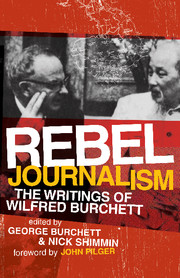Book contents
- Frontmatter
- Contents
- List of Photographs
- Acknowledgements
- Foreword by John Pilger
- Foreword by Gavan McCormack
- Introduction
- 1 The Atomic Plague [1945]
- 2 With Mick Griffith to the Plaine des Lacs [1941]
- 3 Who is Wingate Anyway? [1944]
- 4 The Trial of Cardinal Mindszenty [1951]
- 5 Liberty in Eastern Europe [1951]
- 6 The Microbe War [1953]
- 7 Koje Unscreened [1953]
- 8 The Ball-Point Pen Murders [1954]
- 9 South of the 17th Parallel [1955]
- 10 Front-Line Village [1959]
- 11 Welcome Home [1961]
- 12 Gagarin: The First Interview with Western Journalists [1961]
- 13 Virgin Lands [1962]
- 14 Lilac and Outer Space [1962]
- 15 War Against Trees [1963]
- 16 The Tragedy of South Vietnam's Ethnic Minorities [1964]
- 17 Interview with General Vo Nguyen Giap (April 13, 1964)
- 18 A Fortified Hamlet [1965]
- 19 Patriots & Mercenaries [1965]
- 20 At Ground Level [1966]
- 21 A Spurned Olive Branch [1967/1977]
- 22 Personal Leader [1968]
- 23 The Tet of Peace [1973/1977]
- 24 ‘Something from Nothing’ Township [1976]
- 25 Evaluating the Past [1976]
- 26 Mercenaries: British Export Model [1977]
- 27 The Geneva Conference [1978]
- 28 How to be a Good Khmer Rouge [1981]
- 29 China Prepares to Attack Vietnam [1981]
- 30 Afterword [1983]
- Notes
- Bibliography
- Index
8 - The Ball-Point Pen Murders [1954]
Published online by Cambridge University Press: 22 September 2009
- Frontmatter
- Contents
- List of Photographs
- Acknowledgements
- Foreword by John Pilger
- Foreword by Gavan McCormack
- Introduction
- 1 The Atomic Plague [1945]
- 2 With Mick Griffith to the Plaine des Lacs [1941]
- 3 Who is Wingate Anyway? [1944]
- 4 The Trial of Cardinal Mindszenty [1951]
- 5 Liberty in Eastern Europe [1951]
- 6 The Microbe War [1953]
- 7 Koje Unscreened [1953]
- 8 The Ball-Point Pen Murders [1954]
- 9 South of the 17th Parallel [1955]
- 10 Front-Line Village [1959]
- 11 Welcome Home [1961]
- 12 Gagarin: The First Interview with Western Journalists [1961]
- 13 Virgin Lands [1962]
- 14 Lilac and Outer Space [1962]
- 15 War Against Trees [1963]
- 16 The Tragedy of South Vietnam's Ethnic Minorities [1964]
- 17 Interview with General Vo Nguyen Giap (April 13, 1964)
- 18 A Fortified Hamlet [1965]
- 19 Patriots & Mercenaries [1965]
- 20 At Ground Level [1966]
- 21 A Spurned Olive Branch [1967/1977]
- 22 Personal Leader [1968]
- 23 The Tet of Peace [1973/1977]
- 24 ‘Something from Nothing’ Township [1976]
- 25 Evaluating the Past [1976]
- 26 Mercenaries: British Export Model [1977]
- 27 The Geneva Conference [1978]
- 28 How to be a Good Khmer Rouge [1981]
- 29 China Prepares to Attack Vietnam [1981]
- 30 Afterword [1983]
- Notes
- Bibliography
- Index
Summary
Alan Winnington was a British journalist who became a reporter for the Daily Worker in the 1940s. On travelling to the Far East in 1948, his reports, like Burchett's, became indispensable for anyone who wished to know what was genuinely happening in Asia. Most notably, he was with the victorious Chinese Communist Party leadership as the People's Liberation Army entered Beijing in 1949. On meeting Burchett, the two men became the only two Western journalists reporting from Korea from the Northern side. In an extraordinary parallel with Burchett's experience with the Australian government, in 1954 the renewal of his British passport was refused. Like Burchett, he was said to be a traitor, and accused of interrogation and torture of Allied POWs, and endured abuse for reporting that germ warfare had been used against the Communists. After Korea, Winnington spent some time in Peking, then made his base in East Berlin where he settled in 1960.
Plain Perfidy describes some horrific cases of torture, mutilation and murder of North Korean and Chinese prisoners at the hand of ROK (Republic of Korea) and Kuomintang (Taiwan) agents, supervised by US Psychological Warfare experts. Both this book and Koje Unscreened were dismissed as ‘Communist’ propaganda in some circles during the Cold War, but these abuses have since been corroborated by other published accounts, and now seem disturbingly plausible. On the other hand, evidence of atrocities against Allied POWs is much scarcer; conditions for Allied prisoners were harsh early in the war, but improved once the Chinese became involved.
- Type
- Chapter
- Information
- Rebel JournalismThe Writings of Wilfred Burchett, pp. 79 - 87Publisher: Cambridge University PressPrint publication year: 2007



